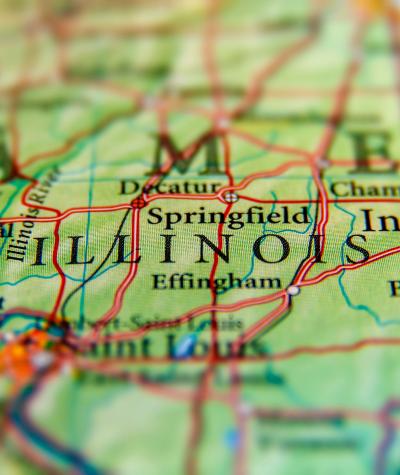In a last-minute effort to try to take advantage of a once in a decade opportunity to fix the state’s deeply broken redistricting process, a group of Illinois House lawmakers is proposing a bill to create fair maps by establishing an independent redistricting commission (IRC).
Every state should have districts that allow every vote to count equally and every voice to be heard. But currently, Illinois’ dysfunctional system enables the party in power to easily slice and dice voters into partisan districts to make their reelection races less competitive.
Under the current process, the Illinois legislature is responsible for drawing congressional and state legislative lines, subject to gubernatorial veto. Democrats currently control all three branches of the Illinois government.
For state legislative lines, if the legislature fails to pass a plan, a “backup” commission is formed, with equal numbers of Democrats and Republicans. If the eight-member commission cannot agree on a plan, the Illinois Supreme Court then puts the names of one Democrat and one Republican into a stovepipe hat.
The name drawn at random becomes the tiebreaker, giving the tie-breaking member’s party complete control over the redistricting process.
This process all but ensures that legislators can draw districts to their partisan advantage and hurts Illinois’ democracy. According to redistricting reform advocates in the state, during the 2018 midterm elections, gerrymandered maps contributed heavily to the fact that nearly half of state legislative races had only one candidate and resulted in nearly 80% being uncompetitive.
Under the IRC proposed in the new piece of legislation, applicants from a pool of 100 would be randomly drawn to serve on an 11-person commission. Seven of the 11 commissioners would be selected by an applicant review panel, and the remaining four commissioners would be selected from the pool by legislators.
According to the bill, the partisan breakdown of commissioners would be four Democrats, four Republicans, and three citizens unaffiliated with either major party. At least seven commissioners must approve a plan, including at least two Democratic-affiliated members, two Republican-affiliated members, and two unaffiliated members.
The bill includes provisions designed to protect against partisan gerrymandering and to ensure representation of communities of color, along with several other redistricting criteria.
If the new maps could not be approved by the June 30th deadline mandated by the state’s constitution, an eight-member bipartisan commission of legislators would be formed to finish the redistricting process.
Illinois Gov. J.B. Pritzker has previously promised to veto maps with partisan gerrymandering or lack of representation for communities of color. However, with Democrats in control of all three political branches, state history shows that this is insufficient to prevent self-interested politicians from dominating the mapmaking process.
Gov. Pritzker must actively work to get the new legislation signed into law and support the creation of an IRC that would guarantee that the people of Illinois could vote under fair maps in the coming decade.
This proposed IRC follows several thwarted attempts to revamp how the state conducts redistricting. The Illinois State Supreme Court blocked constitutional amendments that would have given voters the opportunity to approve IRCs from appearing on the 2014 and 2016 ballots.
Additionally, legislatively-referred efforts to have constitutional amendments appear on the ballot require a three-fifths favorable vote from both the Illinois House and Senate. IRCs failed to gain that level of support in both chambers in 2016 and 2020.
Despite these hurdles, the people of Illinois’ desire for fair and equal representation remains strong. In 2019, an independent poll conducted by the Southern Illinois University’s Paul Simon Institute found that 67% of Illinois voters want an IRC to draw the legislative lines.
A more recent survey commissioned by CHANGE Illinois and conducted by Fako & Associates revealed that 75% of Illinois voters want to end gerrymandering. CHANGE Illinois recently led a coalition of organizations united behind attempting to put a legislatively-referred IRC on the 2020 ballot. Campaign Legal Center (CLC) has long been a member of the coalition seeking redistricting reform in Illinois.
Similarly, a national poll commissioned by CLC in 2019 found strong opposition to gerrymandering with broad, bipartisan support for the creation of IRCs. Notedly, 65% of voters said they would prefer congressional districts with no partisan bias, even if it means fewer seats for their own party.
Because the drawing of districts is based on decennial U.S. Census data, people who live in states where their legislatures determine voting districts could live under gerrymandered maps until 2031 unless reform happens now.
This year’s importance in determining the next decade of government representation has already compelled change in other states. For instance, Wisconsin Gov. Tony Evers signed an executive order setting up a nine-person IRC, after 55 Wisconsin counties representing almost 80% of the state’s population passed referendums supporting redistricting reform.
With the clock ticking, Illinois should follow Wisconsin’s lead now.
At this crucial moment for our democracy, Illinois’ leaders must act to establish IRCs where citizens can play a key role in ensuring in a fair, transparent, and accountable redistricting process. Elections should determined by the people, not politicians.
